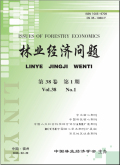林业经济问题2024,Vol.44Issue(2):161-170,10.DOI:10.16832/j.cnki.1005-9709.20240057
农户碳汇林经营意愿与行为一致性研究
Study on the Consistency Between Farmers'Carbon Sink Forest Management Willingness and Behavior
摘要
Abstract
⑴ Background——Under the background of"dual carbon",the development and implementation of forest carbon sinks projects can not only improve the level of forest management,increase the potential of forest carbon sinks,but also play a certain economic and social benefits.However,in reality,due to the long operation cycle of forest carbon sinks projects,there are risks such as natural disasters,technical constraints,market fluctuations and policy changes,etc.As the implementers of forest carbon sinks projects,the willingness of forest farmers to manage forest is higher,but their participation behavior is weak. ⑵ Methods——The research hypotheses were put forward on the basis of theoretical analysis.The research data came from the field survey conducted by the research group in 5 counties(districts)in Zhejiang Province from June 2022 to August 2023,and a total of 519 valid questionnaires were obtained.In this paper,farmers'carbon sinks forest management behavior was selected as the explained variable,benefit cognition and interest cognition was selected as the key explanatory variables,and personal characteristics,family characteristics and village characteristics were selected as the control variables.Based on the perspective of benefit cognition and in-terest cognition,Logit model was used to systematically discuss and compare the effects of these two kinds of cog-nition on the forest farmers’willingness and behavior to manage carbon sinks forests. ⑶Results——From the two cognitive perspectives,there is a significant deviation between the farmers'actual management behavior and participation willingness.Both benefit cognition and interest cognition can signif-icantly improve the farmers' willingness to manage carbon sinks forests,but have no significant effect on their management behavior.In terms of benefit cognition,although both ecological benefit cognition and social benefit cognition can significantly improve the farmers' willingness to manage carbon sinks forests,only social benefit cognition has a significant positive impact on the farmers' management behavior of participating in forest carbon sinks projects.In terms of interest cognition,the farmers' willingness to manage carbon sinks forests is affected by both the amount of interest and the way of interest,and the influence of these two factors is weakened when extended to management behavior. ⑷ Conclusions and Discussions——Based on the above research conclusions,the following policy rec-ommendations are put forward:First,carry out appropriate training,extensively use online media to increase the publicity of carbon sinks projects and the popularization of carbon sinks policies.Second,establish a diversified and market-oriented ecological compensation mechanism to enhance the social benefits of carbon sinks projects by increasing employment positions and forestry technical training,etc.,strengthen the information disclosure of the interest distribution mechanism of forest carbon sinks projects,and encourage farmers to participate in the deci-sion-making on the projects management and interest distribution policies.Third,focus on various factors that af-fect farmers' decision-making,including risk attitude,time preference,information acquisition and processing methods,family structure,community relations,and policy support,etc.Fourth,provide more support measures and incentive mechanisms,establish a long-term tracking mechanism,and continuously optimize the operation mode and management mechanism of forest carbon sinks projects.关键词
森林经营行为/碳汇项目/效益认知/受益认知Key words
forest management behavior/carbon sinks projects/benefit cognition/interest cognition分类
管理科学引用本文复制引用
应梦佳,宁可,杨虹,沈月琴..农户碳汇林经营意愿与行为一致性研究[J].林业经济问题,2024,44(2):161-170,10.基金项目
国家自然科学青年基金项目(72003177)、浙江省哲学社会科学规划之江青年专项课题(24ZJQN045YB)、国家自然科学基金管理学部应急管理项目(72141016) (72003177)

